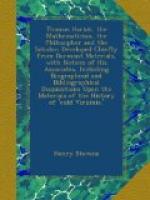About this time, it is understood, Raleigh took up seriously and earnestly the great literary work of his life, The History of the World. It must have been brewing in his mind for years, for in his preface he expressed the fears he had entertained ’that the darkness of age and death would have overtaken him long before the performance.’ The work, according to Camden, was published in April 1614, just before the meeting of Parliament. It appeared anonymously, and for obvious reasons was not entered at Stationers’ Hall. James is said to have had his conscience so pricked by certain passages which everywhere pervade the work on the power, conduct and responsibility of princes, that strenuous efforts were made in January 1615 to call in and suppress it, but the king might as well have attempted to call back a departed spirit by Act of Parliament as to call in that ’ History of the World’ by royal proclamation. The Book was in type and in the hands of the people of England. It could therefore no more be suppressed at that day by princely power than could manifest destiny itself. The second edition of 1621 was the first with Raleigh’s name.
This grand work, which in almost everychapter shows the masterly hand of Raleigh himself, needs no comment here. It is however no disparagement of the book (but the contrary) to say that in the collection, arrangement and condensation of its materials; that in unlocking the muniment room of antiquity and perusing the chief authors of the Greek and Latin classics from Heroditus to Livy and Eusebius, covering a period of near four thousand years, he must have had at cheerful beck powerful and competent aid. To collect, read, collate, note down, and digest these vast and scattered treasures into reasonable and presentable shape for the master mind, required not a bevy of poets and parsons, but one masterly scholar of scientific, analytic, mathematical, philosophical and religious training. Such a man was Hariot.
We read of Gibbon’s twenty years’ fag and toil on the materials of the History of the Roman Empire alone, and at a time when there were many aids not existing in Raleigh’s day. Gibbon personally ransacked the libraries of Europe. Raleigh had scarcely four years to cover the four most ancient empires and a much longer period, and was himself confined to Tower Hill. But he had at command a Hariot, a sort of winged Mercury, who was neither entowered nor hide-bound with conceit or ignorance. He was a marvellously good Greek and Latin scholar, who wrote Latin with almost as much ease as English. One has but to read the vast number of notes, citations and particular references in the History of the World to see the height, depth, and perfect modelling of the structure.




